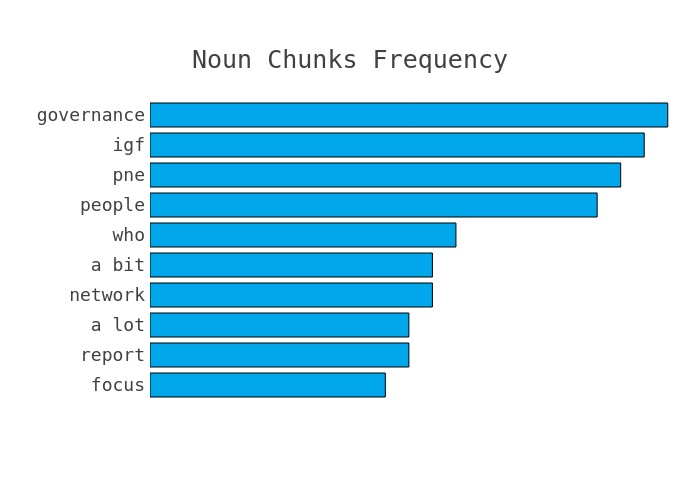Policy network on environment coordination session: Future of PNE
8 Dec 2021 11:45h - 12:45h
Event report
Launched in 2020, Policy Network on Environment and Digitalisation (PNE) explores ways in which digitalisation can be used to accelerate progress towards the UN 2030 Agenda’s climate and environmental goals. One of the main activities of the PNE is a report containing concrete policy recommendations divided into four chapters: Environmental data; Food and water systems; Supply chain transparency and circulatory; and Overarching issues, addressing areas that may not be directly linked to the environment but are nonetheless important to consider when formulating policies. The report addresses two dimensions of environmental sustainability – the use of information and communication technologies (ICTs) for achieving sustainability and the sustainability of ICTs. Session participants addressed each of the four chapters and related recommendations.In his introductory remarks, Mr Juwang Zhu (UN Department of Economic and Social Affairs (DESA)) stressed that digitalisation can be ‘a driver of positive change’ and contribute to ‘a green, inclusive, decarbonised economy’. For this to happen, the digital sector needs to lead by example, by increasingly moving towards renewable energy sources. In addition, there is a need for more investment in digital technology, promoting smart cities that can help reduce emissions, promoting digital government, and advancing sustainable management and the restoration of natural resources through the use of artificial intelligence (AI), the internet of things (IoT), geospatial solutions, and other emerging technologies.
Ms Livia Walpen (Swiss Federal Office of Communications) also referred to the potential of digital technologies in achieving environmental sustainability and noted that the interplay between digital and the environment is high on the Swiss policy agenda. She underscored the important role of the IGF, which can act as the main area for discussing environment and digitalisation and building alliances and networks to address these important challenges.
Presenting the chapter on Environmental data, Ms Jessie Oliver (Australian Citizen Science Association) noted that due to the abundance of environmental data there is a need for standardising and harmonising existing data sets and ensuring the data is accessible. The recommendations of the chapter are in line with those needs. The first recommendation calls for global harmonisation and standardisation of data, while the second refers to ensuring environmental data access from collection to sensemaking. The last recommendation is to increase cooperation to maximise the impact of that environmental information through digitalisation.
The Food and water systems chapter explores the role of digitalisation in contributing to fighting hunger and food insecurity, accessing clean water, and related issues. While digital technologies are not a ‘silver bullet’, Mr David Oehmen (UN Framework Convention on Climate Change (UNFCCC)) sees them as a very powerful tool in solving these challenges. To this end, he listed a set of recommendations. He refers to the first recommendation as a reminder that digitalisation in food systems should always be applied with contextual sensitivity, i.e. being mindful of the local context is very important. The second recommendation calls for increasing capacities for the use of space-derived earth science data for ensuring local food and water security. The third recommendation refers to preparing national and regional plans and strategies to use digital tools for the optimisation of inefficient water systems, especially in developing countries. The fourth recommendation tackles the development or adoption of tools and processes that reduce inefficiencies, and the final recommendation aims to raise awareness and implement risk management policies regarding cybersecurity vulnerabilities associated with the digitalisation of food and water systems.
On the issue of supply chain transparency and circularity, Mr Leandro Navarro (UPC) noted that it is very difficult to come up with solutions that will decrease the immense impact of human activities on the environment. Together with Mr Chris Ip (International Telecommunication Union (ITU)), he nonetheless presented a set of recommendations aimed at addressing the numerous issues associated with the area. The first is on maximising the environmental efficiency of digital technologies and ensuring that technology is not a part of the problem. The recommendations that follow call for international standards for ‘acceptable levels of transparency, traceability, interoperability in all supply chains’, and international standards for implementing circularity across the ICT supply chain. Finally, the fourth recommendation calls for dedicated support for developing countries to tackle e-waste challenges and upgrade repair and recycling activities by, for instance, providing better equipment for informal workers, investing, building capacity, and assisting in drafting and adopting relevant legislation.
The final chapter tackles overarching issues connected to governance aspects and cuts across different domains. In his presentation of the chapter, Mr Florian Cortez (University of Groningen), listed three recommendations. The first aims to increase inclusivity for individuals and communities by calling for greater access to digital resources and skills, investing in digital literacy and accessible digital infrastructure, and encouraging developed countries to take part in building these capacities in developing countries. The second refers to the use of data and digital technologies to foster evidence-based decision making. Finally, the third recommendation calls on countries and stakeholders to experiment with new, participatory approaches (e.g. enable greater citizen participation through better allocation of environmental investments, capacity building and encouraging deliberation among citizens, and building trust).
By Katarina Andjelkovic
Session in numbers and graphs




Automated summary
Diplo’s AI Lab experiments with automated summaries generated from the IGF sessions. They will complement our traditional reporting. Please let us know if you would like to learn more about this experiment at ai@diplomacy.edu. The automated summary of this session can be found at this link.Related topics
Related event

Internet Governance Forum (IGF) 2021
6 Dec 2021 10:00h - 10 Dec 2021 18:00h
Katowice, Poland and Online
